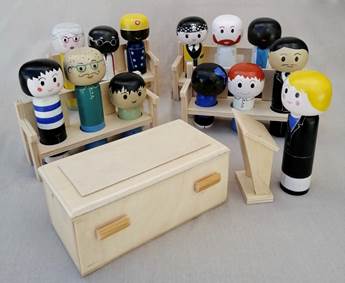
A Kingston University PhD student has created a set of toys to help children with complex needs learn how to express grief and deal with other difficult emotions.
Sarah Helton is in the first stage of a three-year PhD looking at ways children can be supported to communicate about bereavement and grief when they don’t have the verbal skills to articulate how they are feeling. She has created Good Grief Toys to help children understand and communicate about death, bereavement, grief and loss.
The 48-year-old has spent the past few years working part-time as the assistant head of a special needs school in Beaminster, Dorset. Alongside teaching, she has been running a company delivering bereavement training and consultancy support for schools and others helping children with special educational needs and disabilities through difficult times.
During the course of this work, Sarah has seen first hand exactly how much more needs to be done to help these children through the process. “We’ve got much better at supporting the wider population when they’re grieving, but children with special educational needs are often overlooked, especially those with profound disabilities who have little or no ‘typical’ conversational abilities,” she explained.
After receiving a Winston Churchill Memorial Trust fellowship to visit other countries to observe best practice at an international level, Sarah came up with the idea of giving children objects to play with to understand these concepts. “Toys are often used to help children learn skills such as getting dressed and dolls houses can help them develop more of an understanding about family life, so it struck me that this approach would work just as well for this topic,” she said.
Personal experiences of working in special schools where children had sadly died due to medical conditions and seeing their classmates struggle to articulate what was happening was Sarah’s main motivation for creating Good Grief Toys. “I could see on their faces they wanted to know what was going on,” she said. “When I looked at the play corner of the classroom, I could see the children learned best through play and exploration. A set of toys like those we’ve created means they can either focus on the
situation and their feelings on their own or have a teacher or parent use them to explain what has happened.”
Sarah worked with the British Toymakers Guild and the Winston Churchill Memorial Trust to develop the range of wooden toys, which consist of figures of people, furniture, vehicles and other items and have been designed to be used for multiple purposes. “I wanted to make all the furniture multi-functional, so the benches we’ve created could represent pews in a church or a school, the bed used in a hospital, hospice or home. Another piece can adapt to be either a wheelchair or pushchair. The figures of people are of all ages and ethnicities and are a simple design so they are easy to play with,” she said.
Sarah hopes both the toys and her PhD research will result in a greater understanding of the types of support youngsters with special educational needs require to be able to understand and come to terms with the loss of their loved ones. “There’s research around child bereavement for typically developing children and adults with mild/moderate disabilities, but not those with more complex needs,” she explained. “By taking up this PhD, I now have an important opportunity to address this gap.”
The toy sets had proven particularly welcome during the coronavirus pandemic that could otherwise be difficult to explain to children, Sarah said. They have already been snapped up by five schools, two child bereavement charities, a hospital and an independent funeral director. A three-hour support package is provided with each set, with training and guidance on how best to use the toys for different scenarios. “Ideally, they’re the sort of toys every school should have at least one set of in their resources for supporting emotional issues that crop up,” Sarah said.
Palliative care and learning disability expert Professor Irene Tuffrey-Wijne, who is supervising Sarah’s PhD, said it was vital the subject finally got some long overdue attention. “Thinking about our experiences of death and grief is difficult for everyone, but so incredibly important,” Professor Tuffrey-Wijne said. “Children with special educational needs or disabilities may struggle with words or complex concepts, but that will not prevent them from experiencing the distress of bereavement.
“I have been extremely impressed by Sarah’s efforts to find new ways of encouraging children to communicate about grief and helping staff not to be afraid of supporting them. Her Good Grief Toys are a wonderful resource.”
